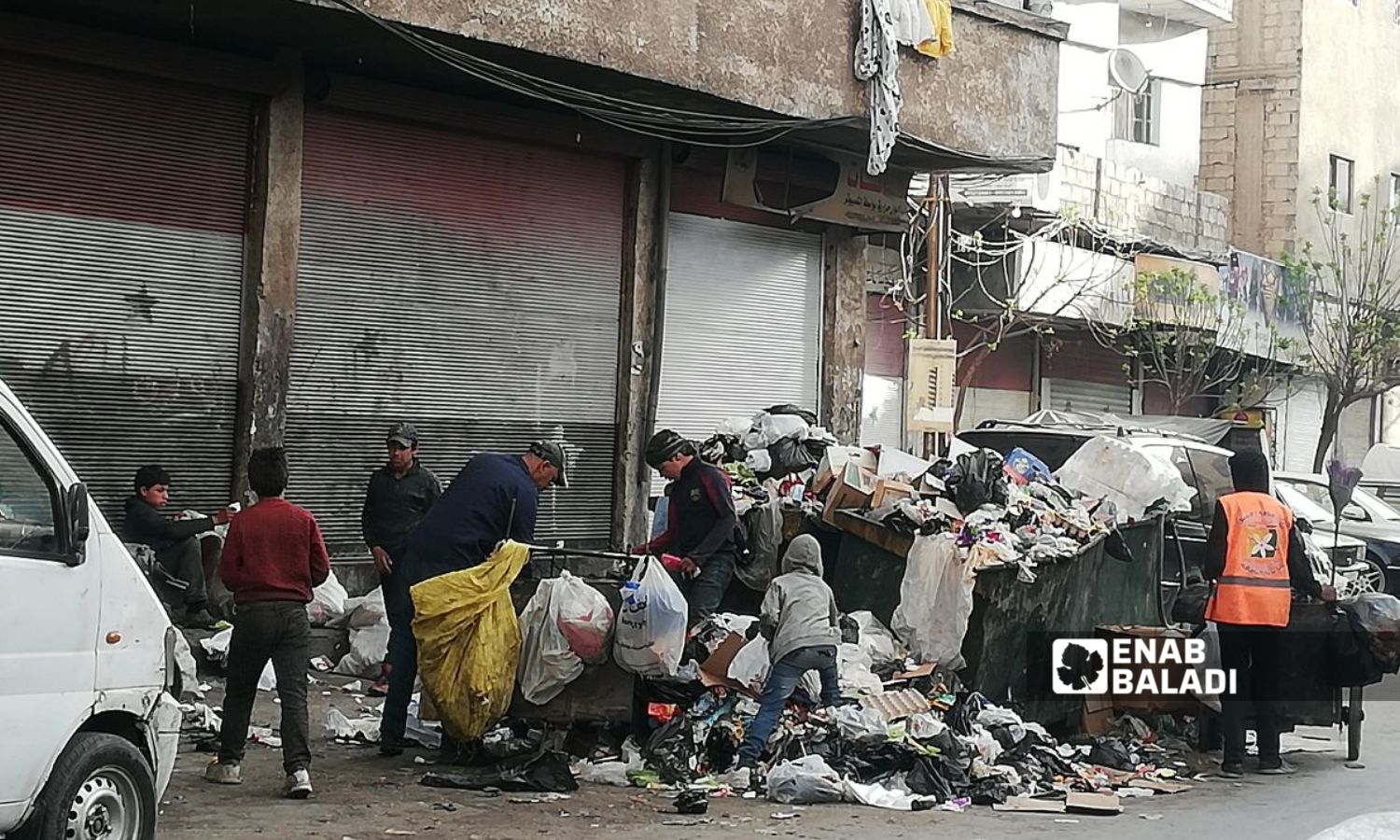
Enab Baladi – Christina al-Shammas
“Every morning, we come with the garbage truck, and the scavengers rush towards us. We stand watching, unable to do anything; if we confront them, they attack us,” said sanitation worker Ahmad Fattah, describing the ordeal he faces while emptying garbage containers in the Duwelaa area of Damascus.
Most areas in Damascus and its countryside are witnessing the phenomenon of waste scavengers, who take over garbage containers and landfills throughout the day, alternating with each other to collect as much leftover glass, plastic, or similar materials as possible.
Residents in these neighborhoods suffer from the prevalence of scavengers in their areas; after garbage containers are emptied by trucks from the Damascus Cleaning Directorate, they return to rummage through the garbage bags in search of usable glass and plastic items, leaving the bags strewn on the edges of the sidewalks, in addition to the foul odors emanating from them.
According to testimonies from residents interviewed by Enab Baladi in the Duwelaa and Keshkool areas—both informal neighborhoods on the eastern outskirts of the capital—waste is constantly spread in the streets of these neighborhoods, especially near the container locations, due to tampering by the scavengers.
Despite residents’ ongoing complaints for appropriate measures to be taken, their demands have not been met up to the time of publishing this report.
Who are the scavengers?
A group of unknown individuals who rummage through garbage bags in containers looking for recyclable materials from solid waste, meaning gathering pieces of plastic, aluminum, and glass to sort and sell on the black market, either by the piece or by weight.
Most of those who scrape garbage are underage and engage in their work illegally, as they don’t possess any permit from the Cleaning Directorate allowing them to carry out these practices.
Their work isn’t limited to rummaging in garbage containers in residential neighborhoods only, but it also extends to regularly infiltrating the landfill in the Ida’shariah area and other waste transfer stations.
According to Tarek Baido, a resident of the Keshkool area, the scavengers who frequent his neighborhood monopolize the area, not allowing another group of waste collectors to enter, and this applies to other areas as well.

The presence of scavengers in the Ida’shariah landfill near Bab Sharqi in Damascus – March 12, 2025 (Enab Baladi/Christina al-Shammas)
Attacks on residents and sanitation workers
Rim al-Abd reported facing “vulgar words and threats of physical harm if confronted again.”
Al-Abd lives in the Duwelaa area of Damascus, where a garbage container is located near her home. The scavengers frequently scatter its contents on the sidewalks, polluting the street, prompting her to confront them to stop, but they attacked her, according to what she told Enab Baladi.
Sanitation worker Omar Hamoud confirmed that there have been repeated attacks on sanitation workers due to their removal of garbage bags before the scavengers have finished extracting materials of interest from within them.
“I was injured on my head after being attacked by one of the scavengers and hit with a piece of glass, simply for doing my job of taking garbage bags,” said Abu Mohammed, a former worker at the Damascus Cleaning Directorate.
The worker added that the scavengers consider themselves the guardians of any item that can be taken from the garbage, which is recyclable and sellable.
Enab Baladi attempted to contact a number of scavengers to discuss their situation, but they refused to provide any information.
Who is behind them?
Residents interviewed by Enab Baladi wonder who is responsible for holding scavengers accountable and regulating their practices, after numerous appeals that have gone unheard.
One former employee at the Damascus Cleaning Directorate, who preferred to remain anonymous, told Enab Baladi that a group of individuals manages the work of the scavengers and exploits their deteriorating financial situation, paying them a sum that is merely “pennies” compared to the profits they make.
According to the worker, the work of scavengers is illegal, and yet no strict measures were taken against them under the previous regime’s rule.
What is the solution?
The general supervisor of the environmental sector at the Damascus Cleaning Directorate, Sabri Abbas, stated to Enab Baladi that they will address the phenomenon of scavengers by prohibiting their presence at waste transfer stations, regardless of their location, as these stations will be put into investment, leaving no room for waste collectors to operate.
Regarding the presence of scavengers in residential neighborhoods, Abbas highlighted future plans being worked on by the Cleaning Directorate in the Damascus Governorate to create smart underground containers. According to the preliminary study for the project, 100 locations for these containers have been identified to reduce garbage accumulation in most residential areas and to eliminate the phenomenon of scavengers.
Diseases and risks from waste exposure
According to a study published by the Arab Journal for Scientific Publishing (AJSP) titled “The Impact of Solid Waste on the Local Community,” individuals may be exposed to health risks from waste in various ways, such as:
- Contact: Such as skin or mucous membrane contact with waste.
- Penetration: For instance, being pricked by used needles or injured by sharp metal waste.
- Ingestion: Like eating food or drinking water or liquids that have been contaminated by waste, such as drinking water tainted by sewage leakage.
- Inhalation: Through the inhalation of aerosols polluted with chemicals from waste or germs, or breathing contaminated air laden with dust.
The study indicated that direct handling and contact with waste could lead to various diseases, including:
Exposure to gastrointestinal germs: Such as E. coli and Salmonella, as well as viruses that can lead to gastroenteritis, and exposure to the Hepatitis A virus, which is transmitted via eating food contaminated with the feces of an infected person.
Parasites associated with animal waste: Like those found in cat feces, which can cause toxoplasmosis, and if contracted by pregnant women, could transfer to the fetus leading to severe complications.
Bacteria from animal reservoirs like rodents: Such as Leptospirosis, an infection linked to rat urine, which can lead to jaundice, meningitis, and kidney damage.
Viruses transmitted through blood: Like Hepatitis B and C, and the HIV virus causing Acquired Immunodeficiency Syndrome (AIDS). This occurs due to being pricked by needles contaminated with viruses, posing a significant issue for those dealing with medical waste.
The post Scavengers dominate Damascus neighborhoods appeared first on Enab Baladi.